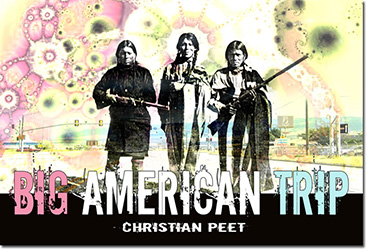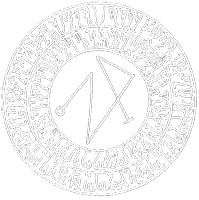BIG AMERICAN TRIP

Big American Trip
by Christian Peet
Shearsman Books, 2009
6″ x 9″, 72 pages
– support indie lit: buy from Small Press Distribution
– or buy from Barnes & Noble or Amazon
– if you live in the UK, buy from Shearsman Books
Big American Trip assumes the form of postcards addressed to a variety of people and organizations, authored by a lone “alien” of unidentified nationality, ethnicity, and gender. A speaker of many languages and master of none, taking comfort in Terrance McKenna’s belief that “the starships of the future will be syntactical,” the alien travels from the Pacific Northwest to the East Coast as s/he studies Strunk and White and deconstructs the language of road signs, the talk of people in gas stations and rest stop bathrooms, the radioed speeches of the US President and Staff—all the while searching for something (A friend? A job? A home?) and coming up empty. Rather than any one alien perspective—Russian, Italian, Israeli, Mexican, Haitian, Cuban, Cambodian, Senegalese, Bangladeshi, a Berliner lost without a GPS and looking for directions on a Salish Indian Reservation—Big American Trip creates a syntax and a grammar at once common and strange, a hybrid language that might speak to anyone who has ever felt out of place or at odds with the Language of a Nation.
Responses to Big American Trip:
“Big American Trip addresses all of our insecurities as artists, as lovers, and as citizens who lack the ability to understand one another, regardless of which language we speak. Peet allows us to look closely at our limits as humans and as Americans in a world filled seemingly with so many opportunities to connect.”
“As we follow the lone wanderer from Blaine, WA, to Brooklyn, we are given an increasingly intimate view of his private frustration with a society that wipes out all that has come before and simultaneously acknowledges its ravaged past with cheerful sound bites. The captions that crown many of the postcards are not-quite-prosaic bits of encyclopedic arcana that offer insight into the matter-of-fact manner in which Americans have treated their predecessors. With these tidbits, Big American Trip seeks to recall America’s erased history, deridable and otherwise. . . . The postcards are at once addressed to no one and everyone; it does not matter who reads them, but everyone will. Buckle up for Christian Peet’s worthwhile Big American Trip.”
“Peet delivers a missive that is as timely now as it has been for centuries. The fact that it still is absolutely necessary and relevant speaks to the true potential this country holds, which has more to do with the need and opportunity for growth and change than it does with any already-present, idealized greatness. Part of the brilliance of Big American Trip is in its delivery—Peet invokes a voice that never has the need to try to cast any sense of persuasion. It is, in its broken English, as native as the rest of us caught in the tide and flux of the melting pot.”
“…an intriguingly strange book, a kind of cross between Michel Butor’s Mobile and Nick Bantock’s Griffin and Sabine Trilogy (or at least that’s what it made me first think of–and thankfully, it’s more Butor than Bantock.) Cleverly constructed, it encourages the reader to explore following different paths through the book–to make their own accompanying, parallel trips.”
“The most impressive aspect of Big American Trip is how Peet is able to interlace politics, linguistic commentary, and a subtle narrative through-line into one book, undercutting any notion that we cannot swell a sentence to something more than just words by breaking its structure, by making it new, by challenging our readers to read for more than one thing, and even more than two; in fact, like the narrator in Big American Trip, Peet asks each reader to look for and decipher everything, all at once.”
“Samuel Richardson’s epistolary novel Pamela is a sad and hilarious book full of devastating social commentary about money, power, sex and British social mores. A couple centuries later, Christian Peet has updated poor Pamela’s well behaved letters into blistering postcards dashed off by a nervy, distraught human being of indeterminate gender who is both losing and finding him/herself in and across a terrifying pre-Obama America. Stamp this one with approval.”
—Rebecca Brown, author of American Romances, Annie Oakley’s Girl, The Dogs, Gifts of the Body, The Terrible Girls, and others
“The author of these postcards has transcribed this alien’s heart. Peet drives through the US landscape (circa early 21st century), offers us the hijacked language of a nation, and through this text asks: and what words have been left for you to use, honestly?”
—Elena Georgiou, author of mercy mercy me and Rhapsody of the Naked Immigrants
“In Big American Trip, Christian Peet rejects the idyllic dream of a post-national freedom, instead going back to those two archaic, fundamental tools of American nation building—the highway system and the postcard—not to find an imagined national community but to reveal the strangeness, violence and noise that results from the U.S. clashing with other cultures, languages and nations, and—just as importantly—clashing with itself.”
—Johannes Göransson, author of Entrance to a colonial pageant in which we all begin to intricate, Dear Ra, and Pilot (Johann the Carousel Horse)
“Christian Peet ravages through the American landscape injecting poems with Americana, pranks, puns, and power. . . . Peet, like Huck Finn, openly challenges authority and those that attempt to construct our world and thoughts for us. If America is a littered landscape of hyperbole, waste, and conformity, then the “wildness,” that feeling of “free-ness” seems to be gone, yet if we look at Peet’s poetry then we find through art and words there are still some of us who are wild and wide-mouth armed with pens and disapproval. . . . Originality, vision, risks, and experimentation to give you back this country as it is: flawed, fractured, hypocritical, greedy, beautiful, breathtaking, mesmerizing, and the constant dialect of a lie and a truth.”
—Steven Karl, author of the chapbooks emissions/ of and (Ir)Rational Animals
“The complexities of alienation hybridize the mouth, double the tongue. Derrida writes, “What does a post card want to say to you? On what conditions is it possible? Its destination traverses you, you no longer know who you are…instead of reaching you it divides you…it leaves you, it gives you.” Christian Peet’s Big American Trip embodies the enigma of the postcard—writing that is at once private and public—and like all letters, these maintain a sense of internal drifting that requires us to question our own sense of identity and location. The logic of Peet’s syntax and juxtapositions gives us the poetry of the divided tongue: in the space between multiple languages, we are invited to trespass our own borders that we might hear (and learn to speak) radical loss. A whole new spin on the classic postcard message: “wish you were here,” Big American Trip is a remarkable, necessary book….”
—Selah Saterstrom, author of The Meat & Spirit Plan and The Pink Institution
